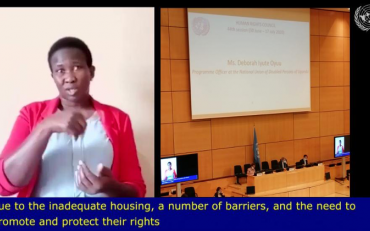On Wednesday, July 8th, the Panel Discussion on the Rights of Persons with Disabilities in the Context of Climate Change took place as a part of the 44th session of the Human Rights Council in the United Nations Office at Geneva.
The Panel, chaired by Ms Elisabeth Tichy-Fisslberger, President of the Human Rights Council, was focused on good practices and lessons learned in the promotion and protection of the rights of persons with disabilities in the context of the adverse impact of climate change. Its main objectives were to understand the benefits of disability-inclusive climate action and to identify opportunities for international cooperation in mitigation and adaptation actions which promote and protect the rights of persons with disabilities.
The panellists of the event were:
- Ms Catalina Devandas Aguilar, Special Rapporteur on the rights of persons with disabilities
- Ms Amalia A. Decena, President of Handicapables Association of Cagayan, Philippines
- Mr Sébastien Jodoin, Assistant Professor at the McGill University Faculty of Law and Canada Research Chair in Human Rights and the Environment
- Ms Deborah Iyute Oyuu, Programme Officer at the National Union of Disabled Persons of Uganda
The International Disability Alliance participated in the Panel and was represented by Ms. Deborah Iyute Oyuu. Ms. Iyute, is a human rights activist from Uganda with extensive experience and knowledge in disability issues, community development, and disaster risk reduction. In her statement, she highlighted how persons with disabilities are disproportionately exposed to the adverse effects of climate change such as water scarcity, food insecurity, economic losses, gender-based violence, inadequate housing, disruption of support services and involuntary displacement. As she stated, the effects of climate change are socially distributed and follow the exact same pattern of pre-existing inequalities in our societies that discriminate against persons with disabilities in multiple and intersectional ways.
Transmission of the video-message of Ms Deborah Iyute at the HRC 44th
Ms Iyute encouraged the States, civil society organizations, humanitarian actors and other relevant stakeholders to follow the principles of the UN Convention on the Rights of Persons with Disabilities through the development of solutions and climate change policies. Among other recommendations, she called for the States to take measures to implement the full range of accessibility obligations under the CRPD, ensure the participation of women and girls with disabilities and under-represented groups in climate change-related policies and mainstreaming the rights of persons with disabilities in all development actions. To conclude, Ms Iyute highlighted the urge of involving persons with disabilities in all the stages of climate change mitigation and adaptation plans. You can read her full statement here.
In the same way, Ms Catalina Devandas Devandas evoked the need to combat ableism and empower persons with disabilities to take action in the context of climate change. She called for inclusive international cooperation policies and the creation of a Constituency of persons with disabilities that would allow them to participate in the United Nations Framework Convention on Climate Change (UNFCCC) and Sendai Framework related policies and decision making. The request for such a constituency was reinforced by the statements of the European Union and several civil society organizations that took the floor during the dialogue.
You can rewatch the full panel here.
To read the Pannel Discussion summary produced by the UN OHCHR click here, and here for the Easy to Read version.

